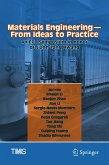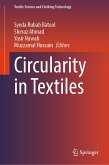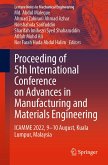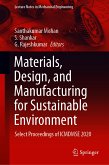The book has six chapters, wherein the first three chapters are devoted to Orthogonal and angle interlock weaving and their quality control aspects. Approach to weaving preforms of complex geometries such as T-stiffeners, tapers, Origami-based structures are also discussed The fourth and fifth chapter are entirely devoted to machinery development for Dual plane shedding based 3D weaving often termed as 'True 3D weaving'. The chapters discuss detailed machine design of the sub-elements such as let-off, shedding, picking, beat-up and take-up. The reader is taken through a prototype development of a 3D weaving machine by way of concept, illustrations, practical development and weaving of samples. The sixth chapter summarises the editor's views about the technology. This volume will be beneficial to scientists and researchers in both academia and the industry.
Dieser Download kann aus rechtlichen Gründen nur mit Rechnungsadresse in A, B, BG, CY, CZ, D, DK, EW, E, FIN, F, GR, HR, H, IRL, I, LT, L, LR, M, NL, PL, P, R, S, SLO, SK ausgeliefert werden.









